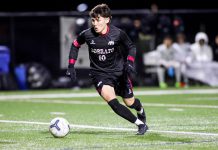Minutes after “officer down” blared from police radios following the tragic shooting on Tuesday of California Highway Patrol Officer Kenyon Youngstrom, a massive behind-the-scenes support system kicked into gear.
And it happens whenever one of their own has fallen.
Every available officer, no matter the color of their badge, responded to the Code 1199.
The Highway Patrol on Tuesday triggered its specially trained 135-member employee assistance team, which immediately swept into full-time care of the stricken Officer Youngstrom’s wife, mother, four children and extended family.
Peer counselors and professional therapists set up shop in the Martinez CHP office and talked through the shock and grief with the officer’s colleagues.
The informal law enforcement network went to work, too. They lined up transportation for the family to and from the hospital and secured donations of food and drinks for the folks who continued to gather and wait at John Muir Medical Center in Walnut Creek during the two days he was kept on life support. Youngstrom was pronounced dead Wednesday evening.
Dozens of men and women in uniform poured into the hospital immediately after the shooting, offering their tears, prayers and support for the family and each other.
Youngstrom’s family has
been especially moved by the sheer number of officers who have come, said CHP Commander John Arrabit, who leads the agency’s Office of Employee Safety and Assistance.
The family’s reaction is a rare bright moment in the nightmare of the past 48 hours.
“Our response is not just a professional responsibility we feel to help our employees’ families,” Arrabit said. “It’s a personal connection with every officer and each and every member of his or her family. We truly believe we are one big family.
“Our response is also important because officers wearing the badge are comforted knowing that if they should pay the ultimate price, their families will be taken care of.”
The CHP has learned the hard way. The 85-year-old agency’s memorial to its fallen officers contains 222 names.
But the layered focus on officers’ mental health and the well-being of the “bluecoat families,” as they are called, represents a major shift in the way modern law enforcement agencies handle tragedies within their ranks, explained Concord Police Department Chaplain Tim Grayson, also a city councilman.
Officers involved in shootings are no longer told to “suck it up” and “get back out there,” which led to alcoholism and drug use, Grayson said.
Likewise, an officer whose family feels alone and frightened may be distracted and make mistakes in a job with very little room for error, he said.
A horrific shooting like Tuesday’s, where an officer is shot point blank during a seemingly routine traffic stop, heaps more stress on police officers and their families in every agency in the state, he added.
“These incidents are an incredible reality check and a huge awakening,” Grayson said. “Suddenly, there are no routine traffic stops. All ‘routine’ goes out the window. Everyone is on high alert with their emotions, their sensitivities, their awareness, and it’s hard to keep that level up.”
The shock can hit anyone, though.
Grayson urged any resident, civilian or uniformed, struggling to cope with the shooting to call the local police department’s non-emergency line and ask for the chaplain.
“That’s what we’re here for,” he said.
Editor’s note: Staff writer Lisa Vorderbrueggen’s son is a California Highway Patrol officer.







